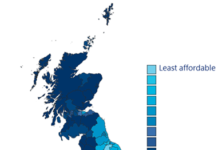PROPERTY EXPERT ON BEST WAY TO NAVIGATE A PROBLEM NOW TERRIFYING MANY HOMEOWNERS
Household budgets are being squeezed ever tighter due to the huge inflation in food and fuel prices, rising taxes and now a 13th consecutive interest rate hike.
Compared to just two years ago, mortgage interest will now cost nearly two and a half times as much.
It is little wonder then homeowners are seriously concerned, with many wondering how on earth they are going to make ends meet.
Commenting, property expert Jonathan Rolande, from the National Association of Property Buyers says: “Right now borrowers should hope for the best – but plan for the worst. Whilst many hope that this is a temporary situation and rates will soon begin to drop, borrowers should not rely on this happening. In the past, when inflation has been high, interest rates have remained higher for some time after the storm has passed. There are already £15bn of mortgage arrears in the UK, that’s just under 1% of all mortgage balances. This is up by 12.5% over the year and will inevitably only get worse. These are very difficult times with potentially worse to come. The sooner inflation and interest rates begin to fall, the better.”
Here, Jonathan shares his advice on what you can do if your mortgage has increased or is set to go up:
If the new amount is affordable you have a choice to either pay the new amount or to try to get an alternative mortgage at a lower rate, or one that is fixed so that you have more certainty. Unfortunately, there are no ‘bargain’ rates at the moment with all products being much more expensive than we have got used to.
Whether rates will come down or not is a gamble as the economic outlook is never certain and is currently harder to predict than ever. Most borrowers tend to make a decision to stick or twist based more on their own circumstances and risk aversion.
If you are worried that payments are not affordable there are a number of things that can be done to avoid potentially affecting your credit rating or even losing your home to repossession.
The most important thing is to acknowledge the difficulty and speak to the lender. There are new assurances that doing so will not affect your credit rating and banks have been instructed to be more sympathetic and helpful. Consider going on to an interest only product or extending the term, either can wipe about £200 a month from an average mortgage (but will cost you more in interest in the long term).
Check for insurances that you may have taken out that cover things like illness or redundancy if these are causing difficulty.
Find out if you are on an SVR (a Standard Variable Rate) – these are often products with hefty interest.
Check for any state benefits you may be entitled to, Support for Mortgage Interest is a little-known benefit that helps with mortgages for people receiving other benefits.
As a final resort, ask for a payment holiday – but this could affect your credit rating.
It is also important to minimise expenditure as much as possible and boost income where you can. Many are turning to renting rooms to lodgers or overseas students – £7500 a year is tax free this way. That’s over £600 a month and would cover the extra interest on an average loan.

| [donate]
| Help keep news FREE for our readersSupporting your local community newspaper/online news outlet is crucial now more than ever. If you believe in independent journalism,then consider making a valuable contribution by making a one-time or monthly donation. We operate in rural areas where providing unbiased news can be challenging. |


















